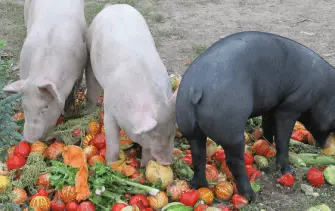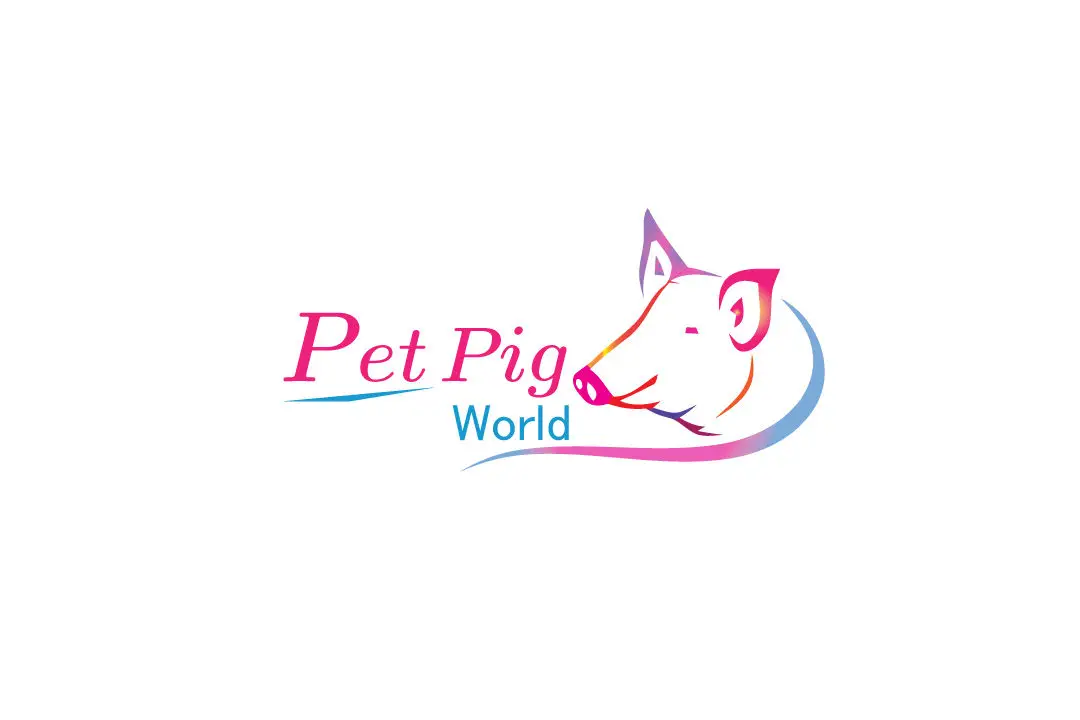It is a known belief that pigs can eat anything, but feeding your pig also means being aware which foods can negatively impact its overall health.
What kinds of food should pigs avoid eating? Pigs should not be eating any food that is high in salt or high in sugar content, especially if the sugar is artificial. They should also steer away from meat because they may contract diseases from it. The same thing goes for moldy or stale food.
Of course, pigs will and can eat anything, especially when given the chance and placed in circumstances that allows it to do so. However, giving a pig free reign on what it wants to eat is not exactly healthy.
Read on to find out what a pig’s diet should, or should not, look like.

What Foods Should Not be Part of a Pig’s Diet?
Understanding a pig’s needs in terms of food is not really a complicated process. They have a single stomach, so their diet is just a simpler variation of what humans need.
Again, pigs WILL and CAN eat anything. However, this doesn’t mean you should let them.
It may be a morbid picture, but pigs who are starving or bored will start to go back to their instincts, and pigs are foragers by nature. Given that they may have limited foraging space in your yard or farm, you can just imagine what they may resort to eating when they don’t really have any other options.
This is why it is important to make sure your pig only has access to food that are good for it.
What should your pig avoid eating?
- Moldy, slimy or rotten food
- Raw meat
- Raw eggs
- Death cap mushrooms
- Foods with high salt content
- Foods with high sugar content
- Pits or seeds from fruits and vegetables
- Leaves, roots, and vines of vegetables
- Unripened vegetables
Just because you hear other people say that pigs eat everything (especially leftovers) doesn’t mean that you should risk their health. Leftovers can get slimy, moldy, or rotten really quick. And when your pig eats them, it’s easy to get virus or bacteria from it.
It’s the same thing for raw meat. You never really know what kind of diseases your pig can get from another animal’s meat.
Raw eggs can mess up your pig’s biotin absorption as well.
You should also avoid giving your pig feeds that are meant for other animals. Other animals, like cats or dogs, have a completely different nutrition requirement. If you feed your pig food that is meant for other animals, there’s a good chance it’s going to miss out on a balanced diet.
Fruits may be good, mostly because it has natural sugars, and not artificial sugars found in candies and other snacks. However, too much sugar is still bad for your pig so easy on the fruits, too.
You should also be warned that not all parts of fruits can be eaten by your pig. For example, the pits or seeds from apples and pears are considered toxic to pigs.
The same holds true for vegetables. Although adding vegetables would be a great way to balance your pig’s diet, it’s important to take out the roots, and sometimes, the leaves. This is especially important if you grow your own crops in your yard as well. Make sure your pig steers clear of that area to prevent it from eating things that may not be good for it.
There are some crops that should be cooked and should never be fed raw to pigs, like potatoes and sweet potatoes.
A vet would most likely have a more extensive list of things you should not be feeding your pig, in case you want a more specific list than the items stated above.
What Should My Pig Be Eating Instead?
To really understand what kind of diet your pig needs, it’s important to have some knowledge on the nutrients that would keep all their bodily functions running efficiently.
The University of California lists these as the most important nutrients that pigs need to thrive:
- Water
Most pig owners focus too much on food that they forget about a pig’s water requirements. If anything, this is sometimes much more important than food.
Water helps deliver important nutrients and minerals to the different cells around a pig’s body. It also directly affects a pig’s appetite. When a pig is deprived of water, the pig also ends up eating less.
Normally, water to feed ratio is set at 2:1, although there are different factors that affect a pig’s recommended daily water intake. These factors include overall health, age, and weight.
Read this article to find out more about water’s important in a pig’s overall health.
- Carbohydrates
Pigs need a lot of energy, especially when they’re at a growing stage, and the best source of energy is carbohydrates.
You may imagine pigs to be the type who would love lying around and doing nothing all day, but this is far from the truth. Pigs are actually very social and playful. They love games and they love solving puzzles. They’re easy to train and they appreciate any kind of physical and mental activity you’ll throw at it.
If you’re looking for ideas on activities your pig can work on, this article is perfect for you.
To help your pig cope with its energy requirements, make sure your pig has enough cereal grains in its diet. This can be oats, wheat, corn or barley.
- Fat
Aside from carbohydrates, fats are also a great source of energy for your pig. However, too much of it can cause some serious health issues, so don’t overdo it.
Fat is also important because it helps your pig gain more weight at a faster pace.
What happens when your pig doesn’t eat enough fats? This can cause a number or skin problems, and can lead to hair loss as well.
- Protein
A pig’s muscles, tissues, and cells are made up of amino acids, and proteins are the primary source of these amino acids. This makes proteins a crucial part of a pig’s growth.
When your pig isn’t given enough protein, your pig may show reduced muscle gain. For lactating sows, lack of protein would also translate to limited milk production.
It’s also possible for pigs to get too much protein, so be careful. Too much protein would not only end up to be a huge expense, it would also be a huge waste because excess protein will not really be a good energy source. It may also lead to some mild diarrhea.
Proteins are found in the usual feeds that you can find in feed stores, like fish meals, soybean meals, bone meals, or cottonseed meals.
- Vitamins
Pigs have the natural ability to produce their own vitamins inside their bodies. However, these are not enough and would need to be supported.
Common feeds normally carry a pig’s required vitamins, although in some cases, your pig may need more of a specific vitamin over the others. In this case, you can also purchase vitamin supplements at a pet store or a feed store.
- Minerals
Some of the most common minerals added to a pig’s diet are sodium, calcium, phosphorous, zinc, chloride, copper, manganese, iron, iodine and selenium.
Each of these minerals have their own uses. For example, calcium and phosphorous can help your pig have strong bones.
But just because these are important to your pig’s health doesn’t mean that you can give them freely. In excess of the required amount, these can also be harmful to your pig’s body.
Related Questions
Can pigs eat bread?
Pigs can eat bread. It could be one of your options if you are low on budget. However, this is definitely not a complete source of nutrients for pigs. This means that bread alone will not do it. You would need to add other food that would add vitamins, proteins and fiber to the pig’s diet. Otherwise, your pig will not grow as needed and could have a series of other health issues.
Is it illegal to feed pigs meat?
In a lot of countries and localities, it is illegal to feed meat to pigs. Pigs are susceptible to diseases that may be found in other animals’ meat. This is also why it is not safe to feed leftovers to pigs. Even if you leave meat out of your leftovers, anything that has come into contact with meat can still make your pig very sick.
